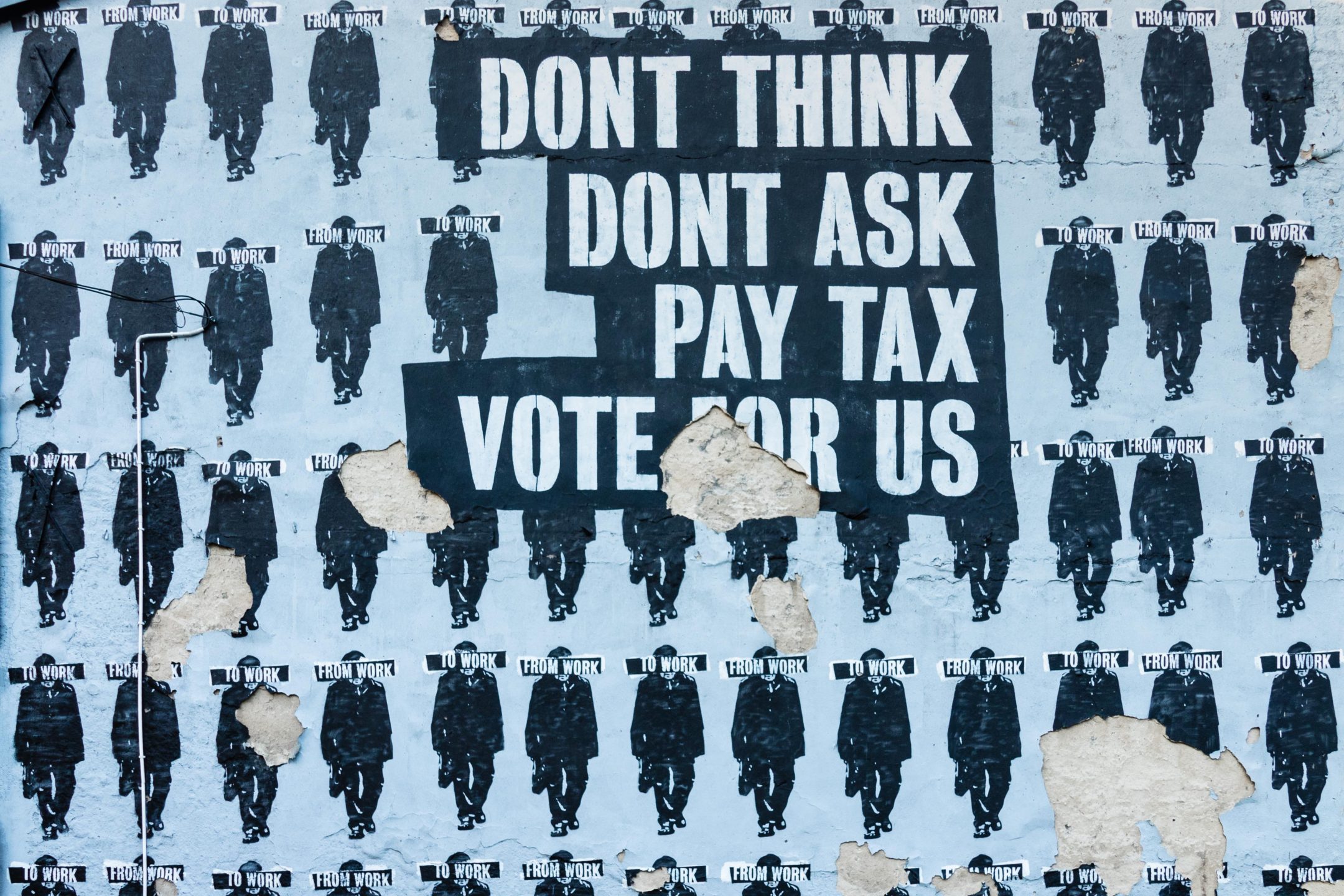Personality tests are constantly in and out of fashion in business and social media. From more “WooWoo” paradigms like horoscopes to more scientific, test-driven models like Myers-Briggs and the Gallup Strengths Assessment, systems of understanding personality can ideally give us insight into ourselves and those around us to help explain the breadth of human behavior and what makes us all unique.
Within different political circles, discussion often shifts to whether certain personality types are more likely to lean in one political direction or another. While these tests never quite reach determinative conclusions and human beings are too complex to be completely contained within neat categories, we can’t help but expect to see people with certain personality tendencies drawn toward particular issues or parties within the sphere of politics.
The current favorite system for understanding personalities for my wife and I is the Enneagram. All the rage within pop-psychology for the past few years, the internet is full of information and error about how to determine one’s type, what those types are like, and how to use that information to move forward toward health and personal development. But there is something unique to the Enneagram that I have not encountered with other personality profiles. And throughout my study of the Enneagram, a number of its insights have stood out to me as particularly useful in understanding how people view politics and, more specifically, why people accept or reject libertarian politics or even Christianity
The Enneagram, At A Glance
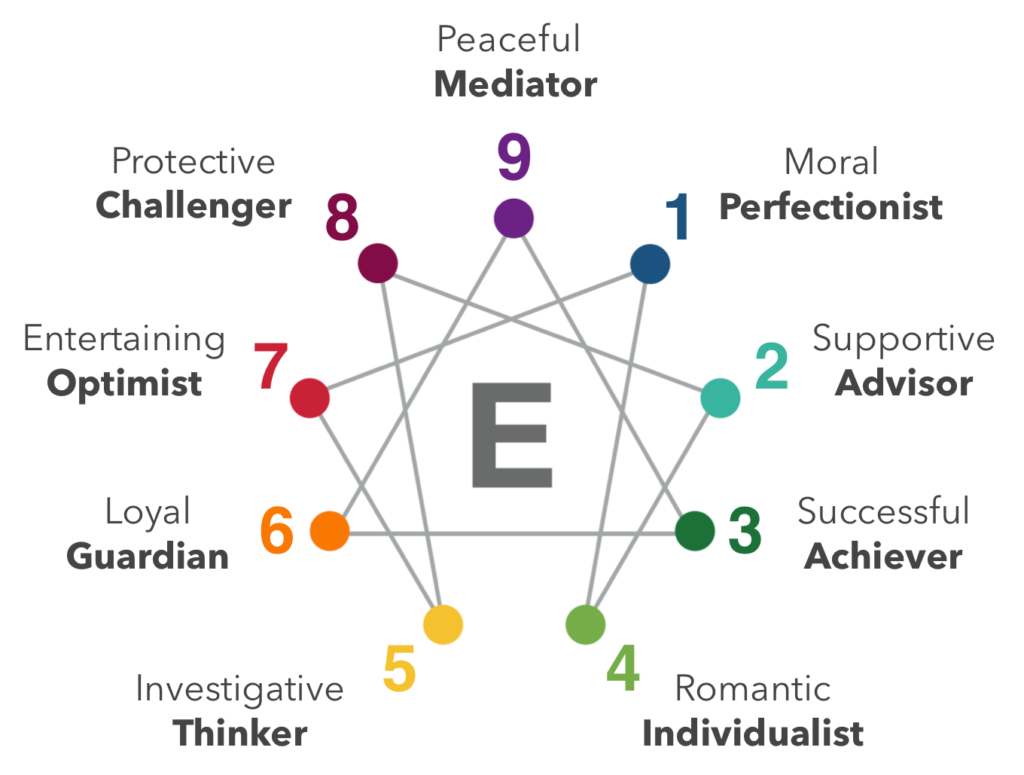
The first thing many will notice about the Enneagram is the unique shape that is used to portray the nine personality types and their links and relationships to one another. It actually resembles, for some, a pentagram, hexagram, or other occultic symbols associated with witchcraft. So you will not be surprised to hear that it is not always viewed highly by those in Christian circles who are unfamiliar with the system itself. Be assured, in my exposure to and study of the system, I have never encountered anything of the sort so these claims are rather baseless.
The complexities of the system are far too numerous to cover in detail but it is simple enough to grasp the main thrust of its approach. In the Enneagram system, human personalities inhabit one of 9 very unique types. Those types go by different names but represent certain human archetypes, many of which are easily recognizable, and you will likely find yourself thinking of certain individuals in your own life who embody each archetype.
As an example, my personal type is the 5, labeled here as the Thinker, investigator, or observer. Type Fives tend to be rabid devourers of knowledge, lovers of books, very observant and intuitive. They also tend to be, though are not limited to, introverts, and depending on certain factors that can range from mild to severe. For some of you, this would probably describe yourself or a loved one. As another example, the 2, here labeled the Advisor, is the characteristic American stereotype of a mother or parental figure. When we think of June Cleaver or our common cultural expectations of what a mother or housewife should be, with attributes like proactive provision of needs, strong empathic tendencies, high sociability, and a heavy focus on relationships, this is the type 2.
The Power and Applicablity of the Enneagram
Each type plays an important role in bringing life and variety of understanding to the full human condition but it is actually the way that the Enneagram further categorizes and ties the types together that makes it particularly powerful and applicable in personal insight and development and particularly useful in understanding the state of the cultural landscape today.
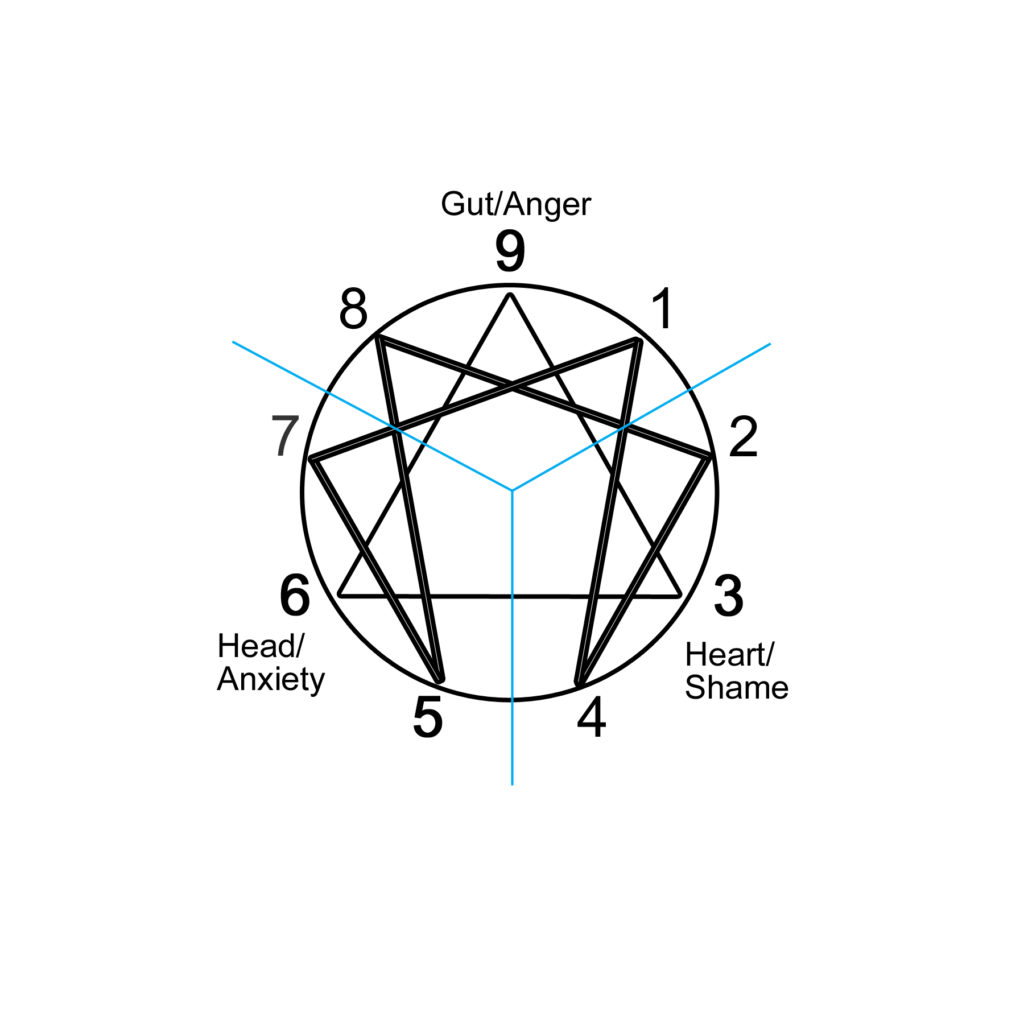
The first useful sub-classification of the Enneagram types is what is known as the Triads. Each Triad is a group of three contiguous types and this grouping primarily describes the way that each type takes in information and the world around them. Types 2, 3, and 4 represent the “Heart” Triad and these types are considered feeling-dominant. Types 5, 6, and 7 represent the “Head” Triad and these types are considered to be thinking-dominant. And types 8, 9, and 1 are referred to as the “Gut” Triad who tend to be doing-dominant. Basically, when considering the Triad for any given type, the description is that of how any given Type is prone to primarily perceive any situation they are presented with. Those in the Heart triad tend to take in information primarily with feelings, the Head triad with thinking, and the Gut triad with doing.
For me, the political implications here are clear. Within many libertarian circles, in fact most likely any intellectual political sub-group, there is a very vocal tendency to view negatively those who do not primarily use thinking to arrive at their preferred political viewpoint. It is usually considered unconscionable that one would use any other tool than the intellect to properly parse through political issues and, naturally, those that arrive at conclusions other than or contrary to one’s own is therefore considered to be, by definition, unintellectual. Those people are therefore often derided and considered less valuable or called names like “sheeple,” the implication being that they are sheep being led not by their own volition but at the whim of others more able or more fit to direct them.
There is both a certain logic and a certain arrogance to this position. I would be lying if I did not admit to having felt this way in the past at one point or another. But through my study of the Enneagram and seeing just how aptly it describes the human being, the simple concept of Triads has brought me to a more, I think, human perspective on the matter. The fact that only 1/3 of human personalities perceive the world primarily through thoughts is both a reality to be grasped and appreciated.
If we are to spread the message of Liberty, this reality stands as a testament to the fact that we must do so via means that are not just intellectual. We must show that libertarian principles not only stand the test of the intellect but are also consistent with our emotions, that the way we feel ought to be consistent with the libertarian life, and that it is not necessary to fully disconnect the brain and the heart in decision making and politics. We must also show that it is possible to live out those principles and that they correspond to our right “instincts” of the gut and, as we will see later, that they reflect a sense of instinctual justice.
The Triads in concept actually represent how each way of understanding the world contributes to the human experience. My opinion has changed from one of purely considering thoughts to be utterly supreme in decision making to that of rightly informed thoughts, emotions, and instincts. The fact is that plenty of people have well-reasoned and thoughtfully considered foundations for their beliefs and yet they often come to different conclusions. And, rightly so, there are those who may arrive at the correct political conclusions based on no proper thinking at all, only a sort of primitive intuition. In this way, we should actually strive toward not just the intellect but toward a rightly informed intellect, toward rightly informed emotions, and rightly informed instincts. All three paths should, given that libertarianism represents a universally applicable way of life, be capable of leading to the same conclusions.
The Basis of Political Messaging
Even within the broad categorization of Triads, each individual’s dominant way of perceiving the world, there are some further granular insights that the Enneagram can bring that are particularly important and useful for understanding political messaging, both why and how people currently receive political messages today, and how we might better craft those messages in the future.
The first thing to understand is that the breakdown in types does not seem to be even across all individuals. For instance, it is commonly held that the Enneagram Type 6 is actually the most common type. This insight is very useful and telling for political messaging. The 6 Type is very concerned with security, it has a dependent relationship with authority, and is commonly concerned with the common good. One of the common personal hangups for 6s is their hesitancy to trust themselves, often deferring to another’s expertise if they can. And they are often known to look for and assess the worst case scenario and might negatively fixate on those scenarios, making them otherwise very risk averse.
The political implications of these factors are numerous. As they constitute a large portion of the population, by extension, they constitute a large portion of the electorate which can greatly influence much of the political and campaign messaging. Most of us are very familiar with the sort of fear-based messaging that is often used when addressing political issues and this messaging can resonate with the baser tendencies of the 6. The image portrayed of politicians and the State as a whole as a guarantor of security and, in many ways, the final and trusted authority is just what the 6 might desire when making political decisions on issues that are sometimes difficult for laypeople to parse. Their desire to see the common good flourish is also played to by progressives and the modern resurgence of Democratic Socialism, wherein their policies are allegedly better for the common man, for most members of society. Their hesitancy to trust themselves may further lead them to desire deference to others who claim expertise. And the more individualistic focus of libertarianism can often shift the risk of life onto the individual rather than the group and this can be very unattractive to those who are prone to avoid that risk.
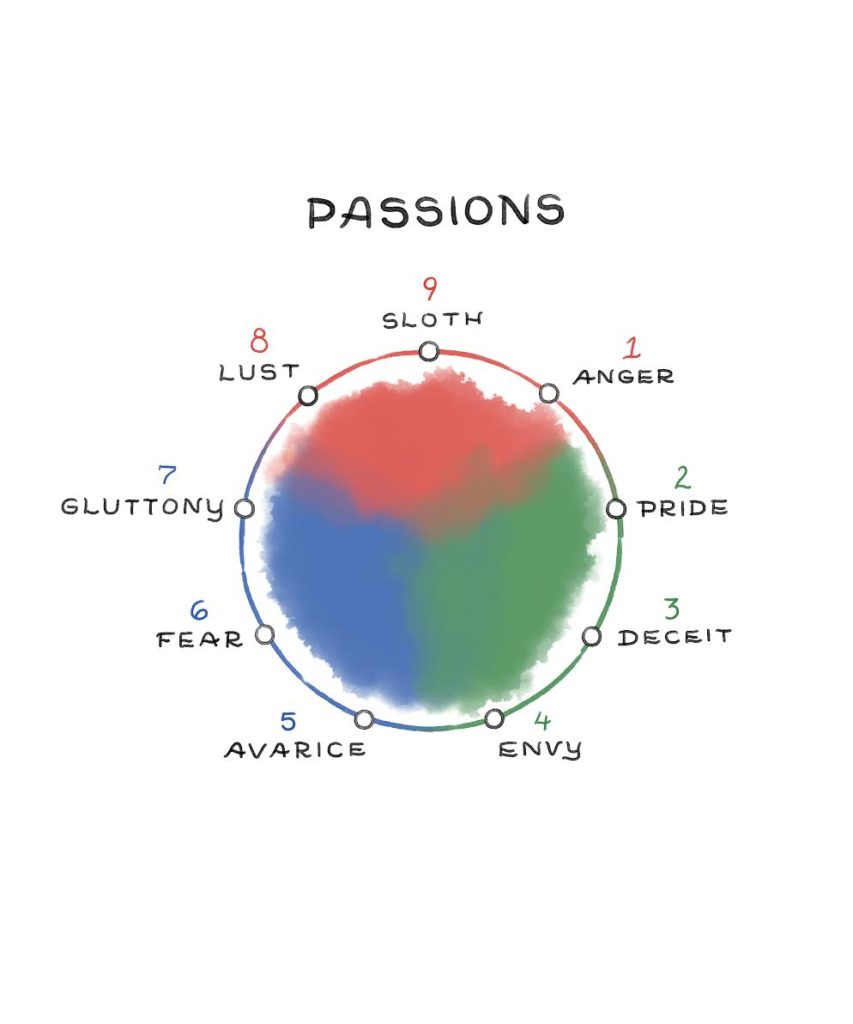
6s actually aren’t the only type in which the deck can be stacked against the message of Liberty. Those in the “Gut” Triad, 8s, 9s, and 1s, actually tend to be very concerned about justice. 8s and 9s in particular, with their access to the aggressive nature of the 8, are particularly prone to relate to issues of Social Justice so it is quite likely that many of the aggressive and vocal figures within the SJW movement today belong to one of these types. But that interest in justice can also actually play a positive role in influencing one towards libertarianism if that sense of justice is well-informed. You may be interested to note that some of the rough polling I’ve done on social media show quite a few 9s, 1s, and 5s and this makes some sense given the sort of introversion and self-selection that goes into such niche groups.
Speaking from my experience as a 5, I would actually predict that quite a few 5s would have the potential to be attracted to systems like Socialism, Communism, or more western proposals like the Universal Basic Income. The reason for this is that 5s experience quite a lot of anxiety around scarcity. It can be a very challenging perception to overcome in practice and the prospect of not having to worry about sustaining oneself, that one’s basic needs would be met without worry, could be quite attractive to a 5 that is content to live in their own intellectual bubble with little desire for material luxuries.
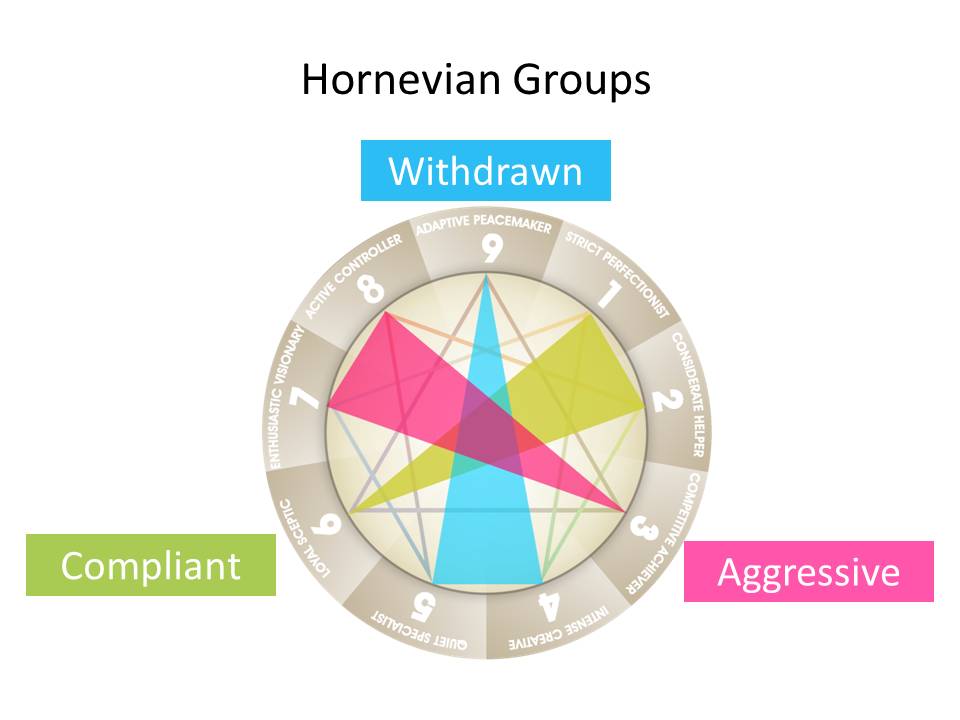
Lastly, the concept of Hornevian Groups, commonly referred to as Stances, within the Enneagram have a lot to tell us about the way different personalities perceive and process information. As we discussed earlier, the Triads represent the primary way in which different human beings take in information by default. But the Stances moreso determine how one processes that information and, just as importantly, how one does not tend to process information. For example, for myself, the type 5, the Head Triad would imply that I take in information through thinking and do not respond with action given that the 5 is within the Withdrawn stance.
But consider this as it pertains to Stances. As we mentioned, type 6 represents the most common type across the Enneagram and the type 2 represents many of the traditional caretakers in society. These types, along with the 1, belong to the Compliant Stance and, more importantly, those within the Compliant stance are said to be thinking-repressed. This means that, when processing information, they tend to shy away from using thinking to do so. As much of libertarian principles are often portrayed as being highly intellectual, this can obviously present an obstacle for those within this Stance as it will not come as naturally to these types to use thinking to arrive at their conclusions. And that thinking repression actually becomes a much bigger problem for 6s as they are not only thinking-repressed but are also thinking-dominant which basically represents a sort of internal confliction and strained relationship between the 6 and thinking as a whole.
The Bottom Line
Now, I know that this has been a lot to take in and, for those unfamiliar with the Enneagram, it can feel like drinking from a waterhose. So let me simply conclude with some much simpler thoughts. More than anything, the wisdom of the Enneagram system can help to shed light on and instruct the way that we discuss so many issues within libertarianism, Christendom, or almost any other area of life. Studying this system has taught me not only a renewed sense of empathy and understanding for those who fundamentally see the world differently than myself but also demonstrated the importance in approaching my evangelism in a more holistic way, without focusing too heavily on the solely intellectual.
But, as it applies to the human experience, my favorite aspect of the Enneagram is the way in which it bears witness to the diversity of mankind specifically as each type represents a different aspect of the attributes of God. Each type not only demonstrates a unique way in which human beings reflect the image of their creator but also demonstrates how broken each human personality is and how much it ultimately falls short of God’s glory. And I think that insight alone is enough to change the way we view those around us forever. As C.S. Lewis says, “it is immortals whom we joke with, work with, marry, snub and exploit – immortal horrors or everlasting splendors.”
For those looking to delve further into the Enneagram, I would recommend The Road Back to You. Or send us a message at adam@nokingbutchrist.org if you’d like to discuss it further.

